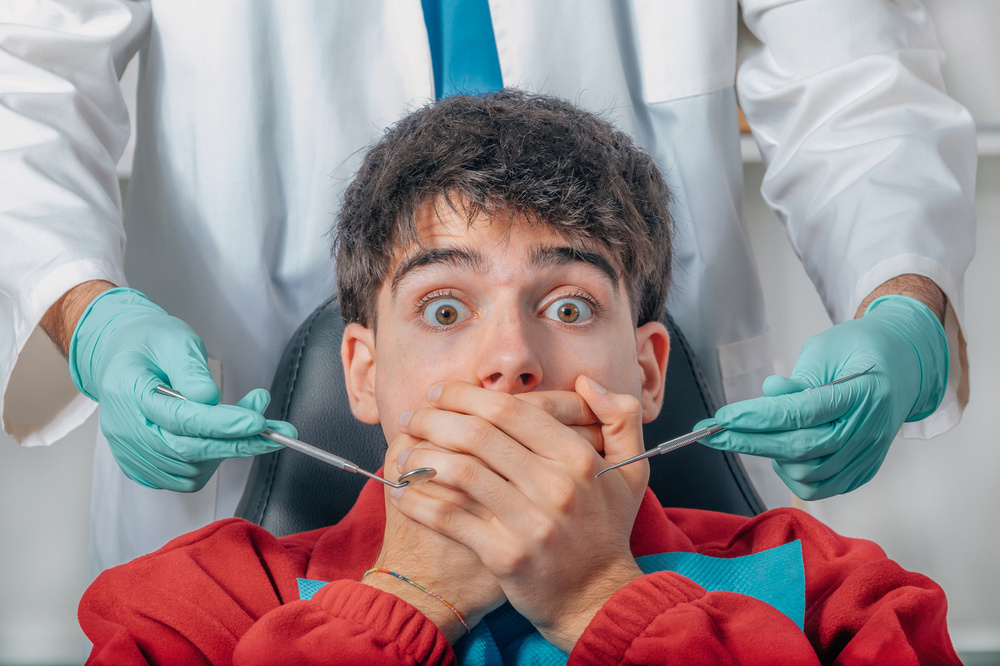Dental Anxiety 101: Psychological Tips
For Overcoming The Fear

A trip to the dentist can evoke deep-seated fear for many. It isn't just the potential discomfort from sharp instruments, as the feeling of vulnerability, the unfamiliar noises, and the unpredictability can also be unsettling.
Do you shiver at the mere thought of your next dental appointment? Imagine having strategies that help you face this fear. What if you could replace your sense of dread with calm anticipation?
This guide offers psychological tactics to diminish dental anxiety. With informed strategies and mindset shifts, you can confront this fear head-on, allowing you to prioritize your oral health without the burden of anxiety.
Understand The Source Of Your Fear
Take a moment to think back on your past dental experiences and see if there's a specific incident that stands out that may have contributed to your dental anxiety. Additionally, reflect on potential triggers that intensify your discomfort. For some, it might be the unsettling sounds commonly associated with dental procedures, while others may find themselves uneasy at the mere thought of reclining back in the dental chair.
Once you pinpoint the root of your anxiety, it's simpler to address and alleviate it. However, it's also important to note that each dental visit is unique. While past experiences may shape your perceptions, they don't determine future encounters. Embracing this mindset can help ease some trepidations.
Learn About Procedures
Uncertainty often amplifies anxiety. Conversely, gaining insight into the procedures, tools, and processes of clinics like Cedar Grove Dental may help alleviate some of that stress. That said, before your visit, research or discuss with your dentist what to expect.
When you're aware of the steps involved in a procedure and are more familiar with the instruments used, you can shift your focus from potential discomfort to a better understanding of the significance of each step in preserving your oral health. Therefore, actively seeking clarity on procedures not only boosts your confidence but also deepens your trust in your dentist.
Embrace Relaxation Techniques
Breathing exercises, visualization, and meditation are potent tools against anxiety. Before your appointment, focus on your breathing. Inhale deeply, hold briefly, then exhale slowly. This simple routine could calm your heart rate and ease tension.
Visual imagery can also be beneficial. Envision a serene setting, like a peaceful beach or a quiet forest. This mental escape might momentarily divert your mind from the present stressors.
You can also use meditation or mindfulness apps to guide your relaxation journey, preparing you mentally for the dentist's chair.

Discuss Your Fears With Your Dentist
Open dialogue can be transformative. It's worth noting that your dentist is a key partner in your oral health journey, so sharing your concerns with them can significantly enhance your overall experience.
When your dentist understands your worries, they can adapt their approach, ensuring you're comfortable. They may offer breaks, provide reassurance, or walk you through each procedure. Moreover, it's common for dentists to encounter patients with varying levels of anxiety, so they are well-prepared and equipped to address your specific needs, ensuring your dental experience is as smooth and comfortable as possible.
Stay Informed With Modern Dental Advancements
The realm of dentistry constantly evolves, with recent advancements aiming to make treatments more patient-centric and less daunting. So, keeping abreast of these changes may dispel fears based on outdated perceptions of dental practices.
Consider laser dentistry, which has revolutionized specific procedures, reducing the need for drills and speeding up recovery. When you're aware of the latest advancements, it becomes evident that many dental treatments are now more patient-friendly.
During your next dental appointment, ask about their latest techniques and tools. This knowledge could provide immense relief.
Establish A Pre-Appointment Routine
Crafting a pre-appointment ritual can be a calming force, helping set a reassuring tone for your dental visit. It could be a specific playlist that soothes you or a few minutes of meditation. Over time, this consistent routine can communicate to your mind and body that there is no imminent threat to worry about.
Additionally, selecting a time for your dental appointments when you feel most at ease can make a noticeable difference. Whether it's early in the morning or after a relaxed lunch, opting for a time that suits your comfort level can enhance your overall experience.
Bring A Comfort Item
Simple comforts can be powerful. For instance, familiar items can ground you, whether it's a cozy blanket, a stress ball, or calming music through headphones. These items can bridge the gap between the dental environment and your comfort zone.
By engaging with these items, you can redirect your attention away from the ongoing procedure, allowing yourself to be more at ease and comfortable.
Consider Sedation Options
If your dental anxiety runs deep, sedation dentistry could be an option to explore. Fortunately, many clinics offer sedation as a way to ensure patient comfort during dental procedures. Depending on the individual's needs and the complexity of the treatment, different levels of sedation are available, ranging from mild relaxation to deeper states where the patient may not remember much of the procedure.
A good starting point is to have an open conversation with your dentist about these methods. By discussing potential sedation methods, you can gain a better understanding of the available options and choose one that aligns with your comfort level.
Conclusion
Confronting dental anxiety is a journey, not a quick fix. By acknowledging fears, communicating openly with your dentist, and adopting coping strategies, dental appointments can shift from daunting ordeals to manageable, even enjoyable, experiences.
Remember, prioritizing your oral health is crucial, so don't let fear hinder your progress toward achieving a radiant smile.